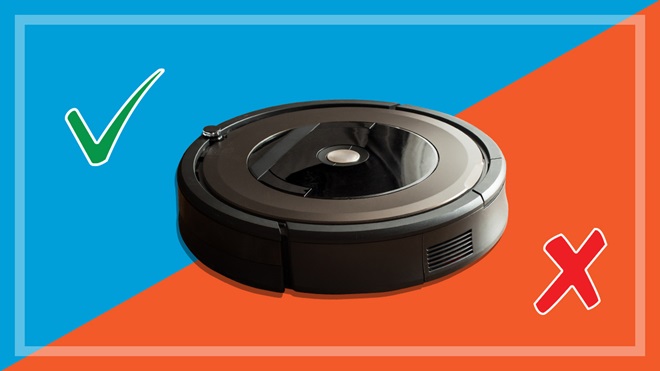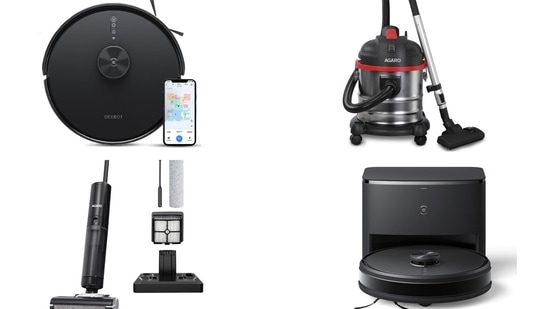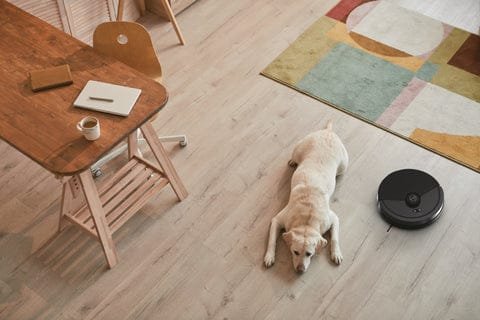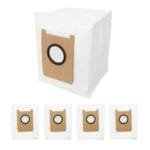Are robot vacuums worth it? Short answer: It depends on your needs.
Comparing real costs and convenience can help you decide. Robot vacuums have become popular in many households. They promise effortless cleaning, but do they deliver? Traditional vacuums are reliable and often cheaper upfront. The key is to understand the full picture.
How do maintenance costs compare? What about the time savings? This blog will explore these questions. We’ll look at the true costs of both options. By the end, you’ll have a clear idea of which vacuum suits your lifestyle and budget. Let’s dive into the details and see if a robot vacuum is a wise investment for you.
Introduction To Robot Vacuums
Robot vacuums have changed home cleaning. These smart devices offer ease and efficiency. But are they worth the cost compared to traditional vacuums? Let’s dive into the world of robot vacuums and see.
Rise Of Robot Vacuums
Robot vacuums emerged in the early 2000s. They gained popularity due to their convenience. These devices can clean floors without human help. Over time, they have become more advanced and affordable.
Today, many homes have a robot vacuum. They save time and effort. They also offer features like scheduled cleaning and automatic docking. Some models even have mapping technology.
Types Of Robot Vacuums
There are several types of robot vacuums. Each type suits different needs and budgets.
- Basic Models: These are the most affordable. They offer simple cleaning functions. They may lack advanced features like mapping.
- Mid-Range Models: These vacuums offer better performance. They often include features like mapping and scheduling.
- High-End Models: These are the most advanced. They offer the best cleaning performance. They include features like app control and advanced mapping.
Choosing the right robot vacuum depends on your needs. Consider factors like floor type, pet hair, and budget. Each type of robot vacuum offers unique benefits.
Advantages Of Robot Vacuums
Robot vacuums have become a popular choice for many households. They offer several advantages over traditional vacuums. These benefits make daily cleaning easier and more efficient. Let’s explore some key advantages.
Convenience And Time-saving
One of the biggest advantages of robot vacuums is their convenience. They can clean your home without any manual effort. You can schedule them to clean at specific times. This feature ensures your floors are always clean, even when you’re not at home.
Robot vacuums also save you a lot of time. Traditional vacuums require you to move around and clean each room. Robot vacuums move around on their own. They navigate through your home, cleaning every corner. This frees up your time for other activities.
Smart Features And Technology
Robot vacuums come equipped with smart features. These include sensors, cameras, and mapping technology. These features help the vacuum navigate your home efficiently. They avoid obstacles and ensure thorough cleaning.
Many robot vacuums also connect to your smartphone. This allows you to control the vacuum remotely. You can start, stop, and schedule cleaning sessions from your phone. Some models even offer voice control through smart home devices.
Robot vacuums are also designed to adapt to different floor types. They can adjust their cleaning modes based on whether they are on carpet, hardwood, or tile. This ensures optimal cleaning performance on all surfaces.
Drawbacks Of Robot Vacuums
Robot vacuums have gained popularity in recent years. They are convenient and easy to use. But they come with some drawbacks. Here, we will discuss the main drawbacks of robot vacuums.
Initial Cost And Maintenance
Robot vacuums can be expensive. The initial cost is higher than traditional vacuums. Some models can cost several hundred dollars. This can be a significant investment for many households.
Maintenance is also a concern. Robot vacuums require regular upkeep. This includes emptying dust bins, cleaning brushes, and replacing filters. These tasks can be time-consuming and add to the overall cost.
| Type | Initial Cost | Maintenance |
|---|---|---|
| Robot Vacuum | High | Regular upkeep needed |
| Traditional Vacuum | Lower | Less frequent upkeep |
Performance Limitations
Robot vacuums have performance limitations. They may not clean as thoroughly as traditional vacuums. They can struggle with deep cleaning carpets. They may miss dirt in corners and tight spaces.
Battery life is another issue. Robot vacuums need to recharge frequently. This can interrupt the cleaning process. Some models have short battery life, limiting their efficiency.
Robot vacuums can also get stuck. They may have trouble navigating around furniture and obstacles. This can be frustrating and require manual intervention.
- May not clean deeply
- Short battery life
- Can get stuck easily

Credit: www.choice.com.au
Traditional Vacuums Overview
Traditional vacuums have been a staple in households for decades. These vacuum cleaners come in various types, each with its own strengths and weaknesses. Understanding the different types and their performance can help you decide if a traditional vacuum is right for you.
Types Of Traditional Vacuums
Traditional vacuums come in several forms. Let’s explore the most common types:
- Upright Vacuums: These are the most popular type. They are easy to use and effective on carpets.
- Canister Vacuums: These vacuums have a separate canister unit. They are great for cleaning stairs and hard-to-reach places.
- Stick Vacuums: These are lightweight and cordless. Ideal for quick clean-ups and small spaces.
- Handheld Vacuums: Perfect for spot cleaning and small messes. They are portable and easy to store.
- Bagged vs. Bagless Vacuums: Bagged vacuums require bags to collect dirt. Bagless vacuums use a bin that you empty.
Performance And Reliability
Traditional vacuums are known for their powerful suction. This makes them effective at deep cleaning carpets and rugs. They also tend to have larger dust capacities, reducing the frequency of emptying.
Reliability is another strong point. Most traditional vacuums are built to last. With proper maintenance, they can serve you for many years.
Here is a quick comparison of the performance attributes of each type:
| Type | Performance | Reliability |
|---|---|---|
| Upright Vacuums | High suction, best for carpets | Very reliable |
| Canister Vacuums | Versatile, good for multiple surfaces | Highly reliable |
| Stick Vacuums | Moderate suction, best for quick clean-ups | Moderately reliable |
| Handheld Vacuums | Low suction, best for spot cleaning | Moderately reliable |
In summary, traditional vacuums offer strong performance and reliability. They are a trusted choice for many households.
Cost Comparison
Choosing between a robot vacuum and a traditional vacuum often boils down to cost. Understanding the upfront and long-term costs will help you decide which option fits your budget and cleaning needs.
Upfront Costs
The initial investment in a vacuum cleaner can vary widely. Here’s a breakdown:
| Type | Average Cost |
|---|---|
| Robot Vacuum | $200 – $1,000+ |
| Traditional Vacuum | $50 – $500 |
Robot vacuums generally have a higher upfront cost. High-end models can cost more than $1,000. Traditional vacuums are more affordable initially. You can find many good models for under $200.
Long-term Costs
Consider the long-term costs as well. These include maintenance, replacement parts, and energy consumption.
| Cost Type | Robot Vacuum | Traditional Vacuum |
|---|---|---|
| Maintenance | $20 – $50/year | $10 – $30/year |
| Replacement Parts | $50 – $200/year | $20 – $100/year |
| Energy Consumption | Low | Moderate |
Maintenance for robot vacuums includes software updates and cleaning the device. Traditional vacuums need less maintenance. Both types require replacement parts like filters and brushes. Energy consumption is generally low for robot vacuums. Traditional vacuums use more power, especially for deep cleaning.
Consider these factors carefully. Upfront and long-term costs can impact your decision significantly.
:max_bytes(150000):strip_icc()/robot-vacuums-GettyImages-1394916842-cda8a9bcf8084e4582e67606d3d91ec3.jpg)
Credit: www.realsimple.com
Performance Comparison
When deciding between robot vacuums and traditional vacuums, performance is key. This section will break down the cleaning efficiency and user experience of both options.
Cleaning Efficiency
Robot vacuums use advanced technology to navigate your home. They use sensors to avoid obstacles and cover more ground. Many models can even return to their charging dock when the battery is low. This autonomy helps keep your home clean with minimal effort.
Most robot vacuums come with powerful suction and rotating brushes. These features help pick up dust, dirt, and pet hair. Some models are designed for specific floor types, such as hardwood or carpet. They can adjust their settings based on the surface they are cleaning.
Traditional vacuums also offer strong suction power. They often come with multiple attachments for different cleaning tasks. You can use them to clean floors, upholstery, and even car interiors. Manual control allows you to target specific areas more effectively.
In summary, both types have their strengths. Robot vacuums offer convenience and automated cleaning. Traditional vacuums provide versatility and power.
User Experience
The user experience with robot vacuums is generally straightforward. Most models come with a mobile app for easy control. You can schedule cleaning times and monitor the vacuum’s progress. Some even work with voice assistants like Alexa or Google Assistant.
With traditional vacuums, the experience is more hands-on. You need to push the vacuum and change attachments as needed. This can be time-consuming, but it offers more direct control.
Both options have their pros and cons. Robot vacuums save you time and effort. Traditional vacuums give you a deeper clean and more control.
Robot vacuums are quieter than most traditional vacuums. This is ideal for homes with pets or small children. You can clean without disturbing the household.
Traditional vacuums can be louder and heavier. This can make them harder to use for extended periods. They are usually cheaper than robot vacuums, making them a budget-friendly option.
In conclusion, both robot and traditional vacuums have unique benefits. Your choice depends on your needs and preferences.
Use Cases And Suitability
When deciding between robot vacuums and traditional vacuums, it’s essential to consider their use cases and suitability. Each type of vacuum has its strengths and weaknesses. Let’s explore where each shines.
Best For Robot Vacuums
Robot vacuums excel in specific situations. They are ideal for:
- Busy lifestyles: If you have a hectic schedule, robot vacuums save time.
- Daily maintenance: They keep floors clean with minimal effort.
- Hard floors: Perfect for hardwood, tile, and laminate surfaces.
- Pet owners: Regular cleaning helps manage pet hair and dander.
- Small spaces: Great for apartments and smaller homes.
Robot vacuums are smart and can navigate around obstacles. They often come with features like scheduled cleaning and smartphone control.
Best For Traditional Vacuums
Traditional vacuums are better suited for:
- Deep cleaning: They offer powerful suction for thorough cleaning.
- Carpeted floors: Ideal for high-pile carpets and rugs.
- Larger homes: More efficient for extensive areas.
- Stairs and upholstery: Attachments make cleaning stairs and furniture easier.
- Allergen control: Advanced filters help trap dust and allergens.
While traditional vacuums require more manual effort, they provide a deeper clean. They are versatile and can handle various surfaces and tasks.

Credit: www.hindustantimes.com
Making The Decision
Deciding between a robot vacuum and a traditional vacuum can be challenging. Each option has its own set of pros and cons. To make an informed decision, it’s essential to understand your specific needs and consider the overall costs involved. In this section, we will help you assess your needs and finalize your decision.
Assessing Your Needs
First, you need to determine what your cleaning needs are. Ask yourself these questions:
- How large is your home?
- Do you have pets that shed a lot?
- Are you home often or away for long periods?
- Do you have a mix of carpet and hard floors?
If you have a large home, a robot vacuum can save you time. For pet owners, many robot vacuums are designed to handle pet hair effectively. If you are often away, a robot vacuum offers the convenience of cleaning while you’re not home. However, traditional vacuums might be more effective for deep cleaning carpets.
Final Considerations
Consider the initial cost and maintenance costs. Robot vacuums can be expensive initially. They also require regular maintenance, like emptying the dustbin and replacing brushes. Traditional vacuums might have a lower initial cost but could require more effort and time to use.
Think about the noise level as well. Robot vacuums tend to be quieter compared to traditional vacuums. If noise is a concern, this could be an important factor.
Finally, consider technology and features. Robot vacuums often come with smart features like scheduled cleaning, mapping technology, and app control. These features add convenience but might not be necessary for everyone.
Here’s a quick comparison table for clarity:
| Factor | Robot Vacuums | Traditional Vacuums |
|---|---|---|
| Initial Cost | High | Low to Moderate |
| Maintenance | Regular | Occasional |
| Noise Level | Low | High |
| Convenience | High | Moderate |
| Effectiveness | Good for daily cleaning | Great for deep cleaning |
By assessing your needs and considering these factors, you can make a well-informed decision on whether a robot vacuum or a traditional vacuum is right for you.
Frequently Asked Questions
Are Robot Vacuums Cost-effective?
Robot vacuums can be cost-effective in the long run. They save time and reduce manual effort. Initial costs are higher, but convenience and advanced features justify the investment.
Do Robot Vacuums Clean As Well As Traditional Vacuums?
Robot vacuums are effective for daily maintenance. However, traditional vacuums may perform better for deep cleaning tasks. Combining both can ensure a thorough clean.
How Long Do Robot Vacuums Last?
Robot vacuums typically last between 3 to 5 years. Proper maintenance, like regular cleaning and battery replacement, can extend their lifespan.
Are Robot Vacuums Good For Pet Hair?
Yes, many robot vacuums are designed to handle pet hair effectively. Look for models with strong suction and specialized brushes for the best results.
Conclusion
Robot vacuums offer convenience and time-saving benefits. Traditional vacuums may cost less initially. Consider your lifestyle and budget. Robot vacuums work well for busy people. Traditional vacuums may suit those with specific needs. Both options have pros and cons. Choose what fits your home best.
Evaluate your priorities and make an informed choice.





